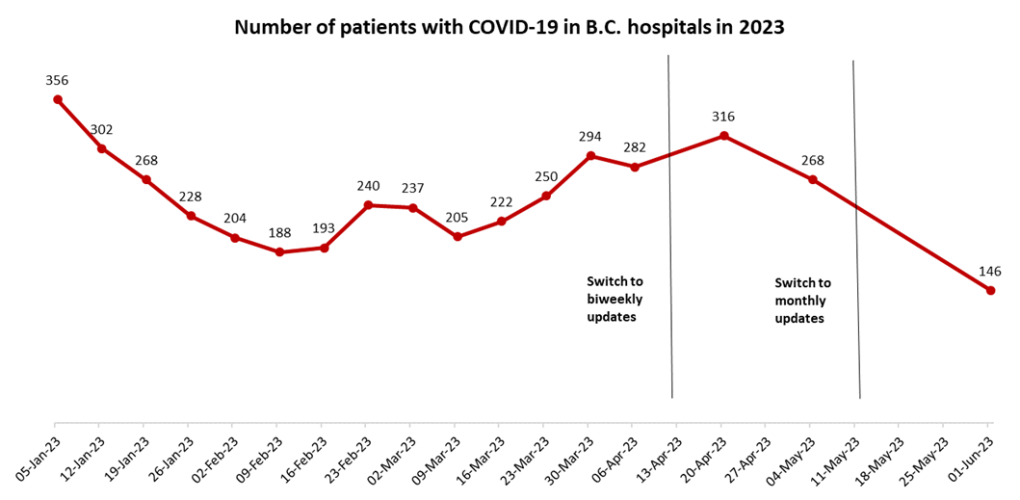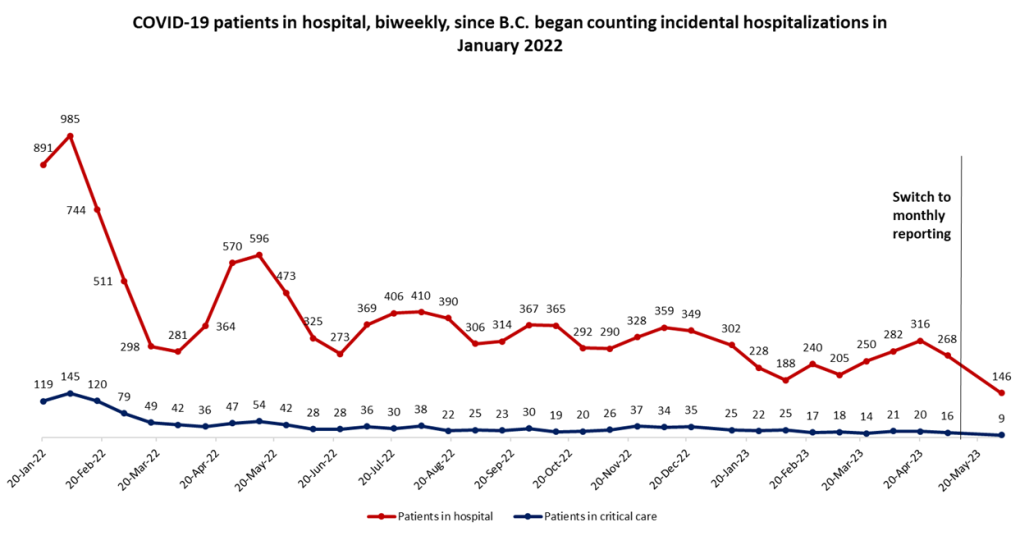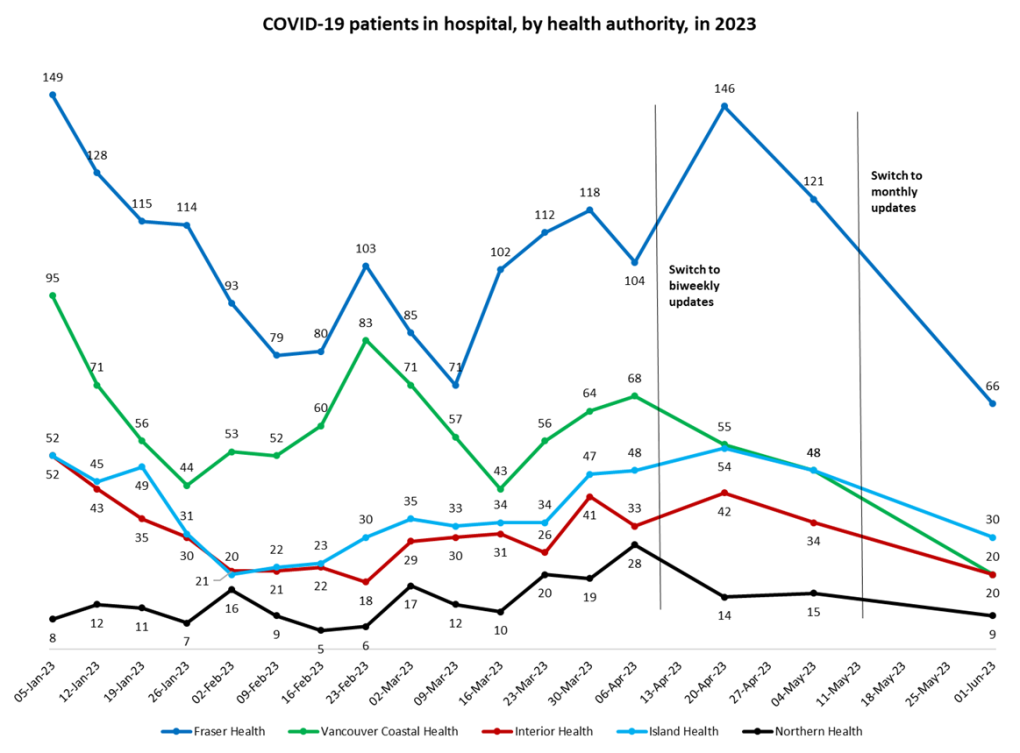B.C. COVID-19 hospitalizations hit their lowest level in almost 2 years this month
 The exterior of the B.C. Centre for Disease Control office in Vancouver is seen in this photo from the centre's website. (bccdc.ca)
The exterior of the B.C. Centre for Disease Control office in Vancouver is seen in this photo from the centre's website. (bccdc.ca)
Weekly wastewater surveillance data from the B.C. Centre for Disease Control suggests COVID-19 transmission has continued declining in the Lower Mainland this month, a week after the centre reported its lowest hospitalization total in nearly two years.
Wastewater data published this week shows decreasing concentrations of the SARS-CoV-2 virus in all five Metro Vancouver treatment plants.
As of June 4, concentrations at Lions Gate treatment plant on the North Shore had declined by 42 per cent compared to the previous week. Northwest Langley saw a decrease of 33 per cent, Annacis Island decreased by 29 per cent, Iona Island saw a 22-per-cent decrease and Lulu Island a 10-per-cent decrease.
Data for treatment plants outside the Lower Mainland had not been updated to include June 4 data as of Friday. Instead, they showed data from May 28, when all tracked regions except Kamloops and Nanaimo saw a decrease.
MONTHLY DATA
Wastewater has been the exception to the BCCDC's transition to monthly reporting of COVID-19 numbers.
Data on wastewater continues to be updated weekly on the centre's website, providing some insight as to the direction disease transmission may be heading between monthly updates.
This month's update, released June 1, showed a significant decline in the number of people in hospital with COVID-19 in B.C., which CTV News has been tracking closely since the start of the pandemic.
There were 146 test-positive COVID-19 patients in B.C. hospitals as of June 1, the lowest total seen all year.
 The number of people in hospital with COVID-19 in B.C. in 2023, as reported by the BCCDC, is shown. (CTV)
The number of people in hospital with COVID-19 in B.C. in 2023, as reported by the BCCDC, is shown. (CTV)
Indeed, the last time the BCCDC reported a hospitalized population lower than 146 was almost two years ago, in August 2021.
At that time, the province used a different method of counting hospitalizations that sought to account for whether COVID was the underlying reason a patient was in hospital. Patients who tested positive for the disease incidentally, while in hospital for other reasons, were not included in the count.
Since the BCCDC began including incidental hospitalizations in its total, 146 is the lowest number it has reported in any update.
 The number of patients in hospital with COVID-19, as reported by the BCCDC, since the province switched to including incidental hospitalizations in its count in January 2022. (CTV)
The number of patients in hospital with COVID-19, as reported by the BCCDC, since the province switched to including incidental hospitalizations in its count in January 2022. (CTV)
Underlying the June numbers were drops in hospitalizations across all of B.C.'s regional health authorities, perhaps most notably in Vancouver Coastal Health, where just 20 people were in hospital as of June 1.
There were fewer people in VCH hospitals than there were in hospitals in the Island Health region, despite the fact that Island Health has roughly 400,000 fewer residents. The VCH total was tied with that of Interior Health, which also has a significantly smaller population.
 The number of COVID-19 patients in hospital by health authority in 2023 is shown. (CTV)
The number of COVID-19 patients in hospital by health authority in 2023 is shown. (CTV)
CTV News asked VCH if it had any explanation for why fewer people are ending up in hospital with COVID-19 in the region. The answer was no.
"COVID continues to circulate and will cause different impacts in different places as it has at all times during the pandemic, however, thanks to high rates of vaccination and less virus circulating, the number of cases continues to decline overall," a spokesperson said via email.
CTVNews.ca Top Stories

Doctors ask Liberal government to reconsider capital gains tax change
The Canadian Medical Association is asking the federal government to reconsider its proposed changes to capital gains taxation, arguing it will affect doctors' retirement savings.
Keeping these exotic pets is 'cruel' and 'dangerous,' Canadian animal advocates say
Canadian pet owners are finding companionship beyond dogs and cats. Tigers, alligators, scorpions and tarantulas are among some of the exotic pets they are keeping in private homes, which pose risks to public safety and animal welfare, advocates say.
Prince William and wife Kate thank public for birthday messages for son Louis
Prince William and his wife Kate thanked the public for their messages which had been sent to mark the sixth birthday of their youngest son Louis on Tuesday.
She was the closest she'd ever been to meeting her biological father. Then life dealt her a blow
Anne Marie Cavner was the closest she'd ever been to meeting her biological father, but then life dealt her a blow. From an unexpected loss to a host of new relationships, a DNA test changed her life, and she doesn't regret a thing.
How quietly promised law changes in the 2024 federal budget could impact your day-to-day life
The 2024 federal budget released last week includes numerous big spending promises that have garnered headlines. But, tucked into the 416-page document are also series of smaller items, such as promising to amend the law regarding infant formula and to force banks to label government rebates, that you may have missed.
Fire engulfs old Edmonton municipal airport hangar
A historical hangar at the former Edmonton municipal airport beside the NAIT main campus was on fire Monday night.
RCMP uncovers plot to sell drones and equipment to Libya
The RCMP says it has uncovered a ploy to sell Chinese drones and military equipment to Libya illegally.
Which foods have the most plastics? You may be surprised
'How much plastic will you have for dinner, sir? And you, ma'am?' While that may seem like a line from a satirical skit on Saturday Night Live, research is showing it's much too close to reality.
'Catch-and-kill' strategy to be a focus as testimony resumes in Trump hush money case
A veteran tabloid publisher was expected to return to the witness stand Tuesday in Donald Trump's historic hush money trial.
































